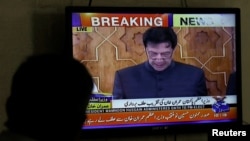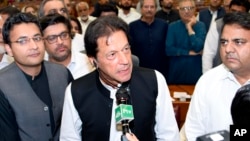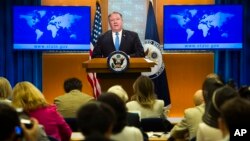Imran Khan, of international cricket fame, took the oath as Pakistan’s 22nd prime minister Saturday. He now faces tough challenges, including depleting foreign exchange reserves and growing international pressure to act against terrorist groups allegedly operating out of the country.
In his acceptance speech following his election in parliament the day before, the former cricket captain promised tough accountability against all who have “robbed the country.”
Khan rose to power on a message against corruption and promises of equal treatment for all in a country where VIP culture is the norm. His mantra of “change” and a “new Pakistan” managed to galvanize a section of the society, including the urban middle class and educated youth, who had previously seen politics as the domain of two dynasties that surrounded themselves with the corrupt and the powerful.
Cash crisis
Khan’s critics, however, accused him of receiving support from the country’s powerful military and intelligence service the Inter Services Intelligence (ISI). Several of the country’s main opposition parties, including the PML-N, the party of the ousted and jailed former prime minister Nawaz Sharif, and PPP, the party of slain former prime minister Benazir Bhutto, alleged election rigging and demanded a parliamentary commission be created to investigate.
The biggest challenge for the new government will be to get the country out of a looming balance of payment crisis. Economists predict that the new government will have to immediately request a bailout package from the International Monetary Fund that could be as large as $14 billion — its largest request ever.
However, U.S. Secretary of State Mike Pompeo recently warned the IMF against lending U.S. taxpayer dollars to Pakistan to pay off Chinese loans.
“Make no mistake: We will be watching what the IMF does. There’s no rationale for IMF tax dollars — and associated with that, American dollars that are part of the IMF funding — for those to go to bail out Chinese bondholders or China itself,” Pompeo said in an interview to American TV channel CNBC.
China has announced plans to invest upward of $60 billion in Pakistan in a project known as the China Pakistan Economic Corridor, which is one of the largest segments of its broader One Belt, One Road initiative. Many of the projects announced under this initiative have already started.
However, Western nations, particularly the U.S., have warned that countries participating in the project may find themselves in a debt trap. A study by the U.S.-based think tank The Center for Global Development listed eight countries, including Pakistan, that are at elevated risk of finding themselves under hefty Chinese debt.
China has loaned Pakistan several billion dollars in the last one year alone to help shore up the country’s foreign exchange reserves, which are hardly enough to cover two months of import bills.
An IMF bailout will also come with terms that might have a negative impact on the country’s poor and clash with Khan’s promises of creating a welfare state.
Pressure from US
The new government will also face growing U.S. pressure to help deliver peace in Afghanistan. The U.S. and Afghan governments have long alleged that the leadership of the Afghan Taliban resides in Pakistan, a charge Islamabad denies. Lack of progress in Afghanistan may result in Pakistan facing pressure on multiple fronts.
In June, Pakistan was added to a list of countries not doing enough against terrorism financing and money laundering by the global watchdog Financial Action Task Force (FATF). The addition to what is known as the “gray list” comes with increased international monitoring and could raise the price of doing business internationally. Many Pakistani officials believe the U.S. coerced members of FATF to add their country to the list as a means of increasing pressure on Pakistan.
Dream realized
The 65-year-old Khan realized his dream of becoming the prime minister after 22 years in politics. He invited members of his former cricket team, who won the 1992 World Cup for Pakistan, to his swearing-in ceremony.
Former Indian cricket star Navjot Singh Sidhu, who was one of the guests at the ceremony, said that Khan had raised the hopes of the people and he now faces “the weight of expectations.”







